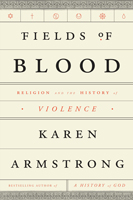Why religion is not to blame
Book review: Karen Armstrong’s ‘Fields of Blood: Religion and the History of Violence’
Fileds of Blood by Karen Armstrong
Share
 FIELDS OF BLOOD: RELIGION AND THE HISTORY OF VIOLENCE
FIELDS OF BLOOD: RELIGION AND THE HISTORY OF VIOLENCE
By Karen Armstrong
Even Armstrong, the former nun turned prominent chronicler of organized religion’s many excesses, finds herself puzzled, not so much by the depth, as by the simple-mindedness of the anti-religious fervour she encounters. From London taxi drivers and Oxford academics, the British writer hears the same mantra: “Religion has been the cause of all the major wars in history.” She doesn’t spell out the obvious rejoinder—what, exactly, was the theological dispute between Hitler and Churchill?—but it is implicit in her references to the wars of the 20th century. Human violence, greed and lust for power have often been materially aided by religious (and other ideological) justifications, but they by no means require them. By the Great War, when Catholics and Protestants alike slaughtered co-religionists, nationalism had long trumped faith as a mystical cause in the West.
Patriotism remains an accepted underpinning for Western war, even if we now put our motives in ideological terms: We don’t just fight for Canada—our families, homes and lives—we fight for our “values,” against not just foreign, but evil, forces. And when some Canadians, in the name of their own higher values, turn violently against the state and its representatives—as two men did in Quebec and Ottawa in late October—our response is visceral and unified, and not very different from that of our more religious ancestors.
Armstrong begins by discussing how religion and everyday life were once inseparable; trying to pull the religion out of any past culture would be like “trying to extract the gin from a cocktail.” (Or ideology from more practical motives today.) With the move to agriculture came property, economic inequality and a ruling class that required mythic justification. The major religions that exist today arose in reaction to the cruelty and oppression of those structures. From the Hebrew prophets to Jesus Christ, Confucius, Zoroaster and Muhammad, their founders all preached what we would now call human rights. (They have all have been co-opted to one degree or another, at one time or another: With Constantine’s conversion came Christianity’s conscription. No faith tradition has ever become a “world religion” without the aid of an expanding empire.)
Yet religion does have powers of cohesion that none of the secular responses to injustice—Marxism, say—has matched. As secular ideologies have faded in effect and appeal, faith has filled the vacuum. Islamic State is exactly the sort of metastasized, theologically based political movement that rightly horrifies everyone, devout or skeptical, who are not within its ranks. But is religion its cause, Armstrong implicitly asks, or what was left after the multiple, cascading failures of virtually every political ideology and military solution applied to the Middle East in the past century?